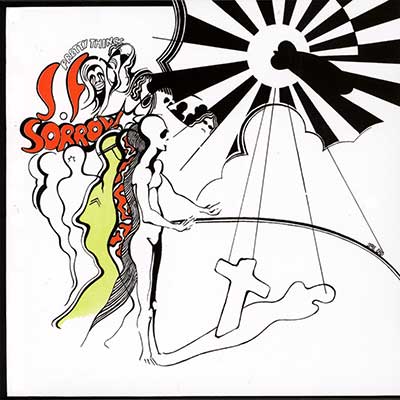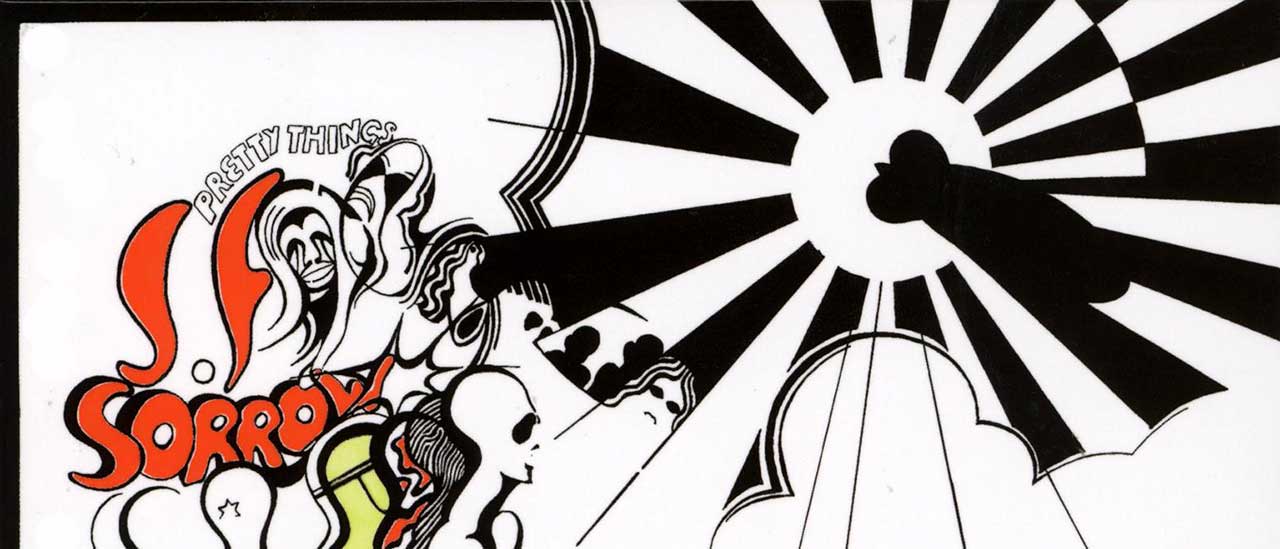
S.F. Sorrow Is Born
Bracelets of Fingers
She Says Good Morning
Private Sorrow
Balloon Burning
Death
Baron Saturday
The Journey
I See You
Well of Destiny
Trust
Old Man Going
Loneliest Person
The Pretty Things S.F. Sorrow was one of the most extraordinary British albums of the late 1960s, and one utterly beset by disaster.
It was the first rock opera, yet its thunder was stolen by The Who’s Tommy; it was one of the crowning glories of English psychedelia, but it was released right after The White Album, just as trends started moving away from teapots-in-the-sky daydreaming to something more earthy; it was a crucial step between psychedelia and prog, but its failure put the band on their heels, just as King Crimson and Yes were starting to establish their reputations.
“What we were trying to do was definitely push the envelope,” says guitarist Dick Taylor, “which prog bands then continued to do.”
“What we were attempting was attempted again by different bands later for whatever their reasons were,” says singer Phil May. “We started to try to do something different. We tried to change the landscape, and a lot of prog bands came along with totally that intention. They didn’t want to be just rock bands.”
Every week, Album of the Week Club listens to and discusses the album in question, votes on how good it is, and publishes our findings, with the aim of giving people reliable reviews and the wider rock community the chance to contribute.

Background
Fittingly, S.F. Sorrow’s roots were in failure. The Pretty Things’ contract with Fontana had expired after the Emotions album had been released in April 1967. That record had been both a commercial flop and an artistic failure.
After making their name playing feral, unhinged R&B, The Pretty Things turned to flowery pop for Emotions, with producer Steve Rowland commissioning Sunday Night At The Palladium-style brass and strings from them to go on top. Freed from their contract, though, they could leave that behind.
“When we finished with Fontana, we could do what the fuck we wanted, which was to go in and do demos,” Taylor says.
The band had decided they didn’t want to make a conventional album of 14 unrelated songs. “We wanted to make a piece of music that hung together, so it was one piece of music made up of different elements,” May says. “I was writing the story as the songs were written. And the story wasn’t complete when recording began.
"The music drove the story and the story drove the music, when it was necessary. When there was a gap in the narrative and a character was created – Baron Saturday – that drove the need for Baron Saturday Meets S.F. Sorrow. It really did evolve on the studio floor."

Other albums released in December 1968
- Head - The Monkees
- Cruising with Ruben & the Jets - The Mothers of Invention
- Beggars Banquet - The Rolling Stones
- James Taylor - James Taylor
- Blood, Sweat & Tears - Blood, Sweat & Tears
- The Natch'l Blues - Taj Mahal
- The Family That Plays Together - Spirit
- Love Is - Eric Burdon & The Animals
- The Soft Machine - The Soft Machine
- Sweet Child - Pentangle

What they said...
"The sound represents the apex of British style psych, and the songwriting is on a par with the best bands of the time. There’s more to discover with each listen and each discovery is rewarding." (Head Heritage)
"The idea of a consistent, flowing rock opera must seem alien to the current downloading generation who listen to albums in bits and pieces, but the minute opener SF Sorrow Is Born kicks in, typical of its time but also evoking the choral lines of traditional musicals with its chants proclaiming the protagonist’s birth, it’s obvious this warrants – no, demands – attention." (Louder Than War)
"Out of step with the back-to-basics approach of both The Beatles and the Stones, S.F. Sorrow still resonates with tripped-out hippy ideology. But there’s a darker edge here, too. A storyline taking in birth, love, war and death sees the titular protagonist ultimately deciding to turn against the world and resign himself to a life of depressed solitude." (Long Live Vinyl)

What you said...
Shane Reho: This sounds sorta like the first two Pink Floyd albums (more Piper than Saucerful) with a small dose of Who Sell Out (the actual songs, that is) thrown in, which makes for an interesting listen.
However, while there isn't anything wrong with the majority of the songs (neither LP side ends on a strong note), there also doesn't seem to be much of a spark here. Granted this is the first time I've listened to this album, or anything by the Pretty Things for all that matters, I wouldn't be surprised if I give this a couple more listens sometime, let it grow on me, then wonder why I wasn't raving about it while I typed this, but that remains to be seen. Long story short: Not blown away, but wouldn't mind revisiting.
Bill Griffin: I like it but it sounds too much like the Beatles of the period and I already don't listen to those albums very often. I really don't see the point in adding another.
Mike Knoop: This week I learned that early British psychedelia is very different from American psychedelia. At least the way the Pretty Things play it here. There’s no electric organ smothering everything else*, no throaty alpha male singer like in Vanilla Fudge or Iron Butterfly, no blatant references to the Vietnam War or drugs or “The Man.”
Instead, there are delicate acoustic guitars strummed with the speed of a hummingbird wings and heavenly choral vocal harmonies galore. Woodwinds, sitar, piano all interweave with standard rock instrumentation to create something more like phantasmagoric chamber pop than a "too many colours" acid trip.
There is definitely an indebtedness to the Beatles, especially on She Says Good Morning and Baron Saturday. But, more than anything, it reminds me of previous club pick Odessey and Oracle by the Zombies. Phil May's voice, especially, reminds me of Colin Blunstone. It's pretty, understated pop that takes multiple listens to unveil itself. I don’t know if I’ll keep listening to it after this week, but I did enjoy it more each time I listened to it.
*Not talking about you, Ray Manzarek. You are infinitely cool.
Carl Black: I've never heard of The pretty things let alone heard any music. So going in blind. And, to start with I found my self skipping down Carnaby Street, wearing a black and white stripped suit with a ruff, and shouting groovy at everything and anything. Some good guitar licks , that echoy drumming and the, over the top English accent, singing.
Than I started drifting and by the end it was back ground music. Pleasant background music, but background music. It did remind me of listening to Tommy by the Who, only because of similar recording sound and the story of the concept didn't really follow through. Anyway I've got to get back to Carnaby Street, I'm meeting Austin Powers for a pint of bitter and mild in the Shakespeare's Head... Groooooooovvvy.
Mauro Lucke: S.F. Sorrow is the kind of album that demands repeated listenings! That's the way I like'em. Pretty good, Pretty Things!
Iain Macaulay: A lot of great albums came out in 1968. Waiting For The Sun, Electric Ladyland, White Light White Heat, Ogdens Nut Gone Flake. All quite consistent, powerful, dynamic, and world changing psychedelic albums. While this is not a bad album – and I do like it for what it is – it is not consistent, powerful, dynamic or world changing. It’s very insular and very, very British. In that respect, in my humble opinion, it doesn’t strike me as a classic album worthy of this page, more an underground, counter culture, curiosity to be celebrated for what it represents in contemporary music history more than what it actually achieved commercially or as an inspiration on other musicians.
While I may have just contradicted myself as to what a classic album is, I would say this is not an album you would play regularly, like the afore mentioned ones, more so on a fun drunken late weekend evening while trawling through albums you haven’t heard for a while to let your equally drunk friends get an introduction into something they may have never heard before. Still, like I said, I like it, but I understand why a lot may not.
Hywel Jones: I'd never heard of these before. Maybe just a little before my time. Was ok, but not likely to play again by choice
Glenn Chadwick: A very strong 8. It kinda gets lost a bit in that 'Well Of destiny" stuff, but really decent tunes and a well fleshed-out story too.
Rich Harper: I had both of the Swansong albums Silk Torpedo and Savage Eye before I heard of S.F. Sorrow, and I couldn’t get on with it. If it was truly a classic album, the band would have been much bigger than they were.

Final Score: 6.43 ⁄10 (502 votes cast, with a total score of 2952)
Join the Album Of The Week Club on Facebook to join in. The history of rock, one album at a time.

